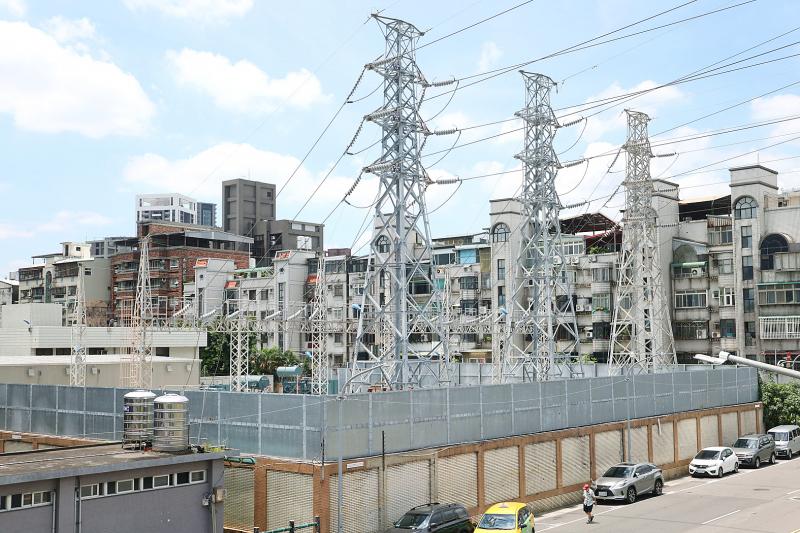State-run Taiwan Power Co (Taipower, 台電) yesterday said that the nation’s peak-hour electricity consumption this summer might exceed 40 gigawatts (GW) due to industrial use and high temperatures.
Peak power usage reached 39.94GW at 1:40pm on Thursday, which was a record and only 60 megawatts (MW) shy of the utility’s predicted maximum, Taipower data showed.
In contrast, yesterday’s peak consumption slid to 38.95GW, as torrential rain in the afternoon helped lower temperatures and reduce residential use of air-conditioning, it said.

Photo: CNA
It previously forecast that peak usage would climb to 40GW late next month or in August, but it is possible that the peak could be reached earlier, Taipower spokesperson Wu Chin-chung (吳進忠) said during the company’s annual shareholders’ meeting in Taipei.
The company was rerunning its prediction model and would revise its forecast at the end of the month at the earliest, while “there is a chance that peak power usage will be even greater than 40GW next month,” Wu said.
Although Taipower had anticipated heavier electricity consumption from semiconductor companies this summer, it did not predict the effects of Russia’s invasion of Ukraine, which has caused coal prices to surge, Wu said.
The rise in coal prices has reduced local cogeneration companies’ profits and made them less willing to sell power to local corporate customers, causing those customers to instead purchase electricity from Taipower, raising overall demand, Wu said.
For example, local cogeneration power plants produced on average 1.2GW last year, but 450MW on average during the day this year, Taipower said.
The utility and the Ministry of Economic Affairs are on Monday to determine electricity pricing, which would likely affect consumption, Taipower said.
If rates are raised, individual and corporate users would have an incentive to reduce electricity usage, and local cogeneration power plants would be more willing to sell electricity, as their rates are linked to Taipower’s pricing, it said.
“We still have faith that we will supply enough electricity this summer by coordinating the plants more efficiently and by having two major electricity generators at the Linkou Power Plant (林口發電廠) and Datan Power Plant (大潭電廠) back in service in the short term,” Taipower acting chairman Tseng Wen-sheng (曾文生) said.
The company yesterday reported a cumulative loss of NT$46.9 billion (US$1.58 billion) for the first four months of the year, compared with a pretax profit of NT$14.7 billion a year earlier, because of higher fuel prices, it said, adding that its aggregate losses widened to NT$85.3 billion as of the end of April.
Electricity consumption grew 3.3 percent annually in the first four months, it added.

SECURITY: As China is ‘reshaping’ Hong Kong’s population, Taiwan must raise the eligibility threshold for applications from Hong Kongers, Chiu Chui-cheng said When Hong Kong and Macau citizens apply for residency in Taiwan, it would be under a new category that includes a “national security observation period,” Mainland Affairs Council (MAC) Minister Chiu Chui-cheng (邱垂正) said yesterday. President William Lai (賴清德) on March 13 announced 17 strategies to counter China’s aggression toward Taiwan, including incorporating national security considerations into the review process for residency applications from Hong Kong and Macau citizens. The situation in Hong Kong is constantly changing, Chiu said to media yesterday on the sidelines of the Taipei Technology Run hosted by the Taipei Neihu Technology Park Development Association. With

CARROT AND STICK: While unrelenting in its military threats, China attracted nearly 40,000 Taiwanese to over 400 business events last year Nearly 40,000 Taiwanese last year joined industry events in China, such as conferences and trade fairs, supported by the Chinese government, a study showed yesterday, as Beijing ramps up a charm offensive toward Taipei alongside military pressure. China has long taken a carrot-and-stick approach to Taiwan, threatening it with the prospect of military action while reaching out to those it believes are amenable to Beijing’s point of view. Taiwanese security officials are wary of what they see as Beijing’s influence campaigns to sway public opinion after Taipei and Beijing gradually resumed travel links halted by the COVID-19 pandemic, but the scale of

A US Marine Corps regiment equipped with Naval Strike Missiles (NSM) is set to participate in the upcoming Balikatan 25 exercise in the Luzon Strait, marking the system’s first-ever deployment in the Philippines. US and Philippine officials have separately confirmed that the Navy Marine Expeditionary Ship Interdiction System (NMESIS) — the mobile launch platform for the Naval Strike Missile — would take part in the joint exercise. The missiles are being deployed to “a strategic first island chain chokepoint” in the waters between Taiwan proper and the Philippines, US-based Naval News reported. “The Luzon Strait and Bashi Channel represent a critical access

Pope Francis is be laid to rest on Saturday after lying in state for three days in St Peter’s Basilica, where the faithful are expected to flock to pay their respects to history’s first Latin American pontiff. The cardinals met yesterday in the Vatican’s synod hall to chart the next steps before a conclave begins to choose Francis’ successor, as condolences poured in from around the world. According to current norms, the conclave must begin between May 5 and 10. The cardinals set the funeral for Saturday at 10am in St Peter’s Square, to be celebrated by the dean of the College